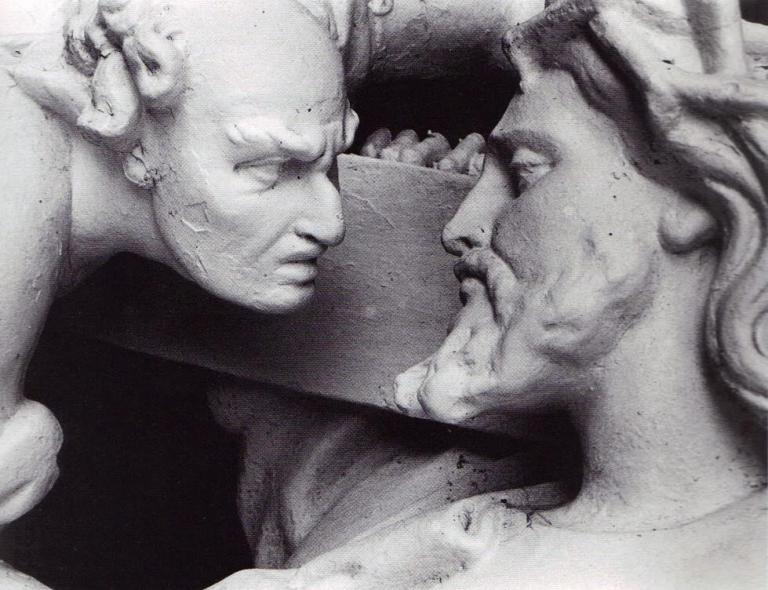It’s Good Friday, and lots of Christians are reflecting on the single most defining truth in our faith-story.
That Jesus died for our sins according to the Scriptures.
Yes, there’s more to the story than just that. But if you were going to pin down one sentence, one phrase, that encapsulates who we are both in our own perception and the perceptions of those outside the church, it would likely be, Jesus died for our sins. Yes, Jesus lived (to inaugurate the kingdom). Yes, Jesus rose (to begin the new creation). Indeed, Jesus is Lord (and Caesar is not). And of a truth, Jesus is coming again (to complete the new kingdom/creation).
But all of this, and the whole story, seems to powerfully pivot on the point of his death.
The problem is, the way we have often understood that phrase – Jesus died for our sins – misses the real depth and significance of Good Friday. We have viewed it primarily as an individual transaction to pay for my damnable mistakes (and save me from the fiery wrath of God in the afterlife). Perhaps the last thing we have in mind when we say it is the thing that is really at the center of it: Israel. For Good Friday, and the crucifixion itself, uniquely locates our faith-story in the story of Israel.
Really, the cross can only be understood the apex of Israel’s prophetic anticipation. What I mean is, the hope for a pathologically unfaithful and politically oppressed nation was a Messiah who would somehow ameliorate their unfaithfulness and liberate them from the empire. And, given this nation’s history of worshiping God through sacrifice, it makes sense that both of these problems might be solved through a scapegoat. In this case, a person who would somehow embody all of Israel’s unfaithfulness and endure the just consequence of their sin – the oppression and retribution of the empire, par excellence, by execution on a Roman cross.
One of the key ways in which Israel had been unfaithful was in their vocation as a light to the world, and in their potential to welcome the world. That is, they persistently adopted the ways of empire – power, greed, excess, violence, oppression – and excluded those on the margins from full religious and social acceptance. During his kingdom-inaugurating life, Jesus confronted this head-on by attacking the unrighteous economies and exclusionary table practices of the religious insiders. Just before his arrest, and likely provoking his arrest, Jesus turned over the tables in the Temple which symbolized both unrighteous economy and religious exclusion.
Thus, Jesus became the true Israel, the light of the world, the one welcoming strangers, the unclean, Gentiles, women.
And Jesus died for Israel’s sins of exclusion.
Obviously, what was true of Israel’s unfaithfulness is no less true of all of us. In this sense, Jesus “is the atoning sacrifice for our [Israel’s] sins, and not only for ours but also for the sins of the whole world.”
And, “now in Christ Jesus you who once were far away have been brought near by the blood of Christ.”
But it goes further than that: “His purpose was to create in himself one new humanity out of the two, thus making peace, and in one body to reconcile both of them to God through the cross, by which he put to death their hostility.”
Through the cross, the prophetic anticipation of Israel’s forgiveness and restoration was accomplished. But also the forgiveness and restoration of everyone. And the making one of two groups formerly at odds – the religious and non-religious, the insiders and outsiders, those at the table and those eating the crumbs. Reunited as one new humanity.
Jesus died to be inclusive. So why is the church so bent on being exclusive? [Tweet This]
Why do we continue to practice policies and doctrines that deny the humanity of those who identify differently? Why do we create new classes of the unclean? Why can’t women lead? Why do gay people face dehumanization and discrimination? Why do racial minorities find themselves outnumbered and outcast?
On Good Friday, this is what we must consider. That the whole meaning of the cross is wrapped up in putting to death the hostility between insiders and outsiders. In restoring the welcome of the covenant, so that Abraham’s family may truly become a family of many nations, peoples, and cultures. Indeed, a blessing to the whole world.
Today, on Good Friday, Jesus is dying to be inclusive.
Why aren’t we?
—
Postscript:
By the way, if the cross is our defining truth, it must be the truth that ties together all the other truths. And indeed it is. Because the Messiah was really, truly the Liberating King of Israel. And, as he inaugurated the kingdom during his life, he qualified himself, not just to be a scapegoat, but to be a spotless, innocent lamb. And for this reason, God couldn’t allow the innocent king to remain in the tomb. The empire couldn’t keep this good man down. That would be wrong.
So, God raised him from the dead.
And after Jesus rose, he ascended to reign at the right hand of God the Father, leading a host of captives in his wake, including the empire, sin, and, now, even death itself.
The true light of the world has guaranteed that no unfaithfulness can stop the new kingdom and creation from restoring perfect peace, justice, and love to the good world that God has made.
So we might as well join him, forgiven and free from guilt, in welcoming all into this covenant family.
It’s Friday – but Sunday’s coming.












